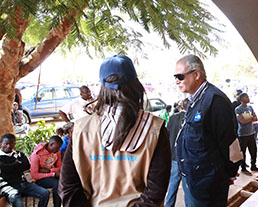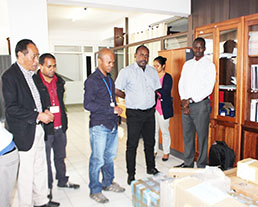Need Help?
Please Feel Free to Contact Us. We Will Get Back to you within 1-2 Business Days.
info@comesa.int
+260 211 229 725/32
WAR ECONOMY PROGRAMME
The Programme has strengthened legal frameworks around war economies through drafting a regional policy for artisanal and small-scale miners. It has also developed laws on the suppression of illegal mineral exploration and a code of conduct for Corporate Governance and Corporate Social Responsibility. The programme also started the process of enhancing the capacity of artisanal and small-scale miners, whom it identified as vulnerable groups in the mining sector.
DEMOCRACY AND GOVERNANCE
The programme developed best practices in electoral processes and Electoral Management Bodies (EMBs) in the COMESA region which were adopted by COMESA Policy Organs. The programme also strengthened COMESA capacity in elections observations through the development of Guidelines on the Conduct of COMESA Elections Observer Missions, which are still being used by the programme as well as a pool of trained election observers in Member States. The programme has, in addition, established the COMESA Electoral Management Bodies (EMBs) Forum for peer support. The programme has continued to improve the conduct of elections by providing recommendations to Member States to improve the holding of future elections in at least 29 plebiscites.
REGIONAL MARITIME SECURITY PROGRAMME
The programme has assisted Member States to strengthen their Anti-Money Laundering and Combating Financing of Terrorism (AML/CFT) regimes, supported them to comply to international standards as set by the Financial Action Task Force (FATF). The programme by 2020 had assisted three countries to join FATF-Style Regional Bodies (FSRBs); provided equipment and analytical software to Financial Intelligence Units (FIUs) of five countries. The programme is currently assisting three FIUs to attain standards that would qualify them to join the Egmont Group of FIUs; has provided training to a wide range of stakeholders including Law Enforcement Agencies (LEAs) to improve financial investigation, prosecution, asset forfeiture; assisted with AML law reviews and development of guidelines, among others.
CONFLICT PREVENTION
Among other things, COMESA has:
- Established a robust theory-informed and data-driven early warning system which forecasts Structural Vulnerability Assessments (SVAs) of Member States using the COMESA Peace and Prosperity Index (CPPI) as its target. The programme has disseminated its SVAs to several Member States which have committed to developing response mechanisms to address vulnerability factors. COMESA has also provided the AU Continental Early Warning System (CEWS) a platform to disseminate the voluntary Country Structural Vulnerability and Resilience Assessments (CSVRA) and Country Structural Vulnerability and Mitigation Strategy (CSVMS), which will enhance synergy with the COMWARN SVA process.
- Put in place a Committee of Elders to augment the office of the Secretary General with Preventive Peace-making assignments. The Committee has supported successful elections in at least six elections through high-level pre-election assessments as well as supported fact-finding missions and preventive diplomacy missions in situations of conflict or crisis. Some of these pre-election assessment missions have been done in partnership with the AU and other RECs/ RMs.
- Post-Conflict Reconstruction and Development: By 2020, the programme had established 16 Trade Information Desks (TIDs) at the border areas of DRC and its eastern neighbours (Rwanda, Burundi, Uganda and Zambia). The TIDs are equipped with IT infrastructure including computers, printers, scanners and fitted with solar panels. The TID Managers provide trade information to small scale cross-border traders, provided them with tools, resolved disputes at the border areas and collect data on cross-border trade. As a result, there has been an increase in cross border trade as well as a marked improvement in relations between border communities and officials at the border areas. The programme also commenced the construction of border markets at three border areas. This has now been transferred to the Great Lakes Trade Facilitation programme. Due to its outcomes and potential impact, the programme attracted numerous donors including USAID, DFID, TradeMark South Africa (TMSA), GIZ, KfW Bank of Germany and AfDB.




